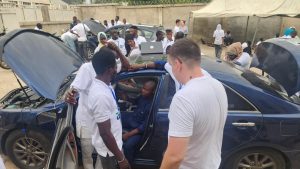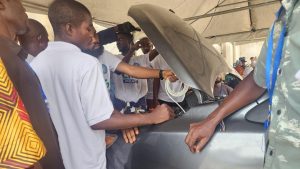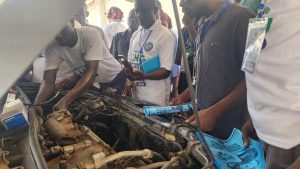Kogi State Launches Youth Training in CNG Conversion and Celebrates Progress of ACReSAL Project
In a strategic move to invigorate the local economy and promote environmental sustainability, the Kogi State Government has kicked off a comprehensive training program targeting 2,310 young people. This initiative, conducted across all 21 Local Government Areas, focuses on equipping youths with skills in Compressed Natural Gas (CNG) conversion technology—a forward-looking energy solution aligned with Nigeria’s push for cleaner, sustainable energy sources.


In collaboration with Sufpay Ltd, the training aims not only to foster technical expertise but also to create employment opportunities for young people, while supporting the country’s broader goals of reducing reliance on petrol and promoting renewable energy.
Empowering Youths for a Sustainable Future
During a visit to Lokoja, Kingsley Femi Fanwo, the Commissioner for Information and Communications, expressed enthusiasm about the program. He emphasised that this initiative represents a bold step toward positioning Kogi as a key player in Nigeria’s energy revolution.
“This is about cultivating a new generation of skilled professionals capable of competing and contributing meaningfully in the emerging energy landscape. CNG is the future, and we’re proud to prepare our youths for it.”
Fanwo highlighted the dual benefits of the program: strengthening the local economy and addressing insecurity through the productive engagement of young people. He also acknowledged Governor Alhaji Ahmed Usman Ododo’s unwavering commitment to youth empowerment, describing the initiative as a clear demonstration of that resolve.
Special thanks were extended to Sufpay Ltd for their technical expertise and dedication in bringing this vision to life. The decentralised training approach, with centres in Lokoja, Okene, Idah, and Kabba, allows youths to learn within familiar environments, enhancing accessibility and participation.
Celebrating Progress at the ACReSAL Project
In addition to youth empowerment, the Kogi State Government recently showcased significant strides in environmental and community resilience through the Agro-Climatic Resilience in Semi-Arid Landscapes (ACReSAL) Project. Following a three-day inspection across key intervention sites in Okene, Ankpa, and Kabba/Bunu LGAs, officials expressed satisfaction with the project’s progress.
The inspection covered water harvesting systems, gully erosion control measures, Community Resilience Facilities (CRF), and agroforestry zones. The team praised the project’s adherence to quality standards, noting rapid and effective implementation.
Engr. Oluwasegun Joseph, Chair of the State Steering Committee, reaffirmed the government’s commitment to improving livelihoods and building climate resilience among communities.
“This project exemplifies our dedication to improving the lives of our people and ensuring sustainable development,” he stated.
The inspection was also attended by Engr. Farouk Danladi, Commissioner for Water Resources and Co-Chairman of the SSC, who lauded the exceptional progress made within a short period—particularly in Kabba, Ankpa, and Okene—described the project as a model for integrated regional development.
Project Coordinator Barrister Ladi Ahmed Jatto expressed gratitude to Governor Ododo for his unwavering support, as well as to the World Bank and national ACReSAL teams for their technical guidance.
“The core goals of ACReSAL—land restoration, livelihood enhancement, and food security—are being progressively achieved thanks to strong institutional backing,” she explained.
The ongoing monitoring and evaluation efforts by the Kogi State Government underscore its commitment to transparency, impactful intervention, and sustainable development. As the project continues, stakeholders are optimistic that ACReSAL will significantly boost climate adaptation, agricultural productivity, and environmental resilience across the state.
Kogi’s leadership remains focused on long-term socio-economic growth, demonstrating that strategic investments in people and the environment are paving the way for a brighter, sustainable future.



